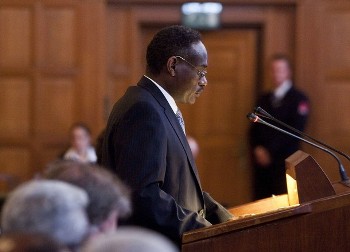South Sudan independence a “reality”, NCP official says
January 9, 2010 (KHARTOUM) – The Sudanese ruling National Congress Party (NCP) appeared resigned to a pro-secession choice in the 2011 referendum for the people of South Sudan.
 Al-Dardiri Mohamed Ahmed, a leading figure at the NCP, was quoted by local press as saying that the separation of the south from the north became the “reality and inevitable” blaming the Sudan People Liberation Movement (SPLM) for this outcome.
Al-Dardiri Mohamed Ahmed, a leading figure at the NCP, was quoted by local press as saying that the separation of the south from the north became the “reality and inevitable” blaming the Sudan People Liberation Movement (SPLM) for this outcome.
“We should be realistic and talk about what is current and what should be. We in the NCP were keener than anyone else on unity, but the SPLM blocked that option for us, and we missed the opportunity” he said.
He ruled out any possibility for averting the probable secession vote in the remaining timeframe saying that the process should be “smooth, peaceful and attractive” to prevent any return to war. Furthermore, he said that North and South Sudan should have “brotherly relations” in a post secession scenario.
Ahmed slammed the ex-southern rebel group saying it failed to manage the South adding that the latter now is in a state of chaos governed by the “law of the forest”.
However, the deputy SPLM secretary general for the Northern sector Yasir Arman placed the blame on the NCP saying the latter deals with the country’s major issues “in a moody manner” accusing it of fueling conflicts and tribal clashes.
Arman said that the SPLM is committed to the principle of attractive unity and called on the Sudanese people to hold on to the unity choice and work for it.
Last month the NCP & SPLM agreed on a referendum bill last month after much wrangling that created a political deadlock in the country raising fears of resume return to civil war. It will only take a 50%+1 ‘Yes’ vote and a 60% turnover to make South Sudan independence choice valid.
The Comprehensive Peace Agreement (CPA) was signed exactly five years ago between the Sudanese government and the former SPLM rebels in Nairobi ending more than two decades of civil war in the country.
Many observers and opposition figures accuse the NCP of making the secession choice more appealing particularly after the 1989 coup that brought it to power. Critics say that the religious slogans and Islamic ideology emphasized by the government during the civil war coupled with a fierce military campaign in the south has fueled the anti-unity sentiments.
Furthermore, the death of the former SPLM chairman John Garang in a helicopter crash in 2005 is believed to have all but demolished chances of Sudan remaining united. Garang was a strong proponent of unity.
(ST)
